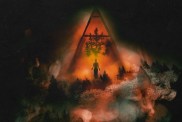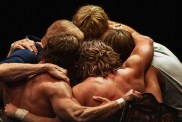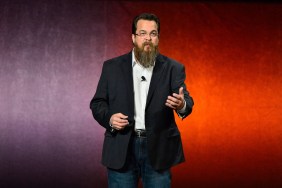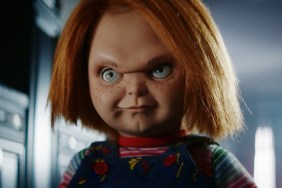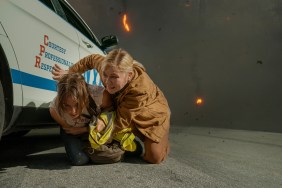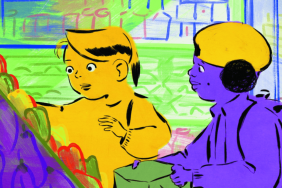As he celebrates fifty years in the entertainment business, filmmaker Ron Howard has quite a roster of movies under his belt, having adapted bestselling novels like The Da Vinci Code, explored the lives of interesting real people in biopics such as A Beautiful Mind and Cinderella Man and recreated famous moments in history with classic films like Apollo 13.
Howard’s new movie, an adaptation of Peter Morgan’s hit play Frost/Nixon, uses many of the filmmaking muscles he’s developed making those other movies, but it’s also an intriguing study of the political climate in the country during the ’70s following Watergate.
It stars Michael Sheen as David Frost, the opportunistic British television producer and talk show host, who decides to invest his own money into convincing former President Richard Nixon (Frank Langella) to sit down for an extended interview mere months after his controversial resignation. The results were a historic confrontation between two very different men, one a powerful political figure looking for redemption, the other an outsider who made his career with the interviews, and for those who missed the play, it’s a great way to see these two acclaimed actors giving career-defining performances.
Ron Howard was in New York to talk about the movie and ComingSoon.net was there with a few other journalists to throw some questions his way.
CS: When you saw the play at the Donmar, did you immediately think “This would make a great movie and we could do it like this and this.” Or did that all come later?
Ron Howard: No, I’d read it and I thought there were challenges, but they were such great characters. I was so surprised at how entertaining and how engrossing this story was, and even suspenseful. When I went to the Donmar, it just sort of doubled or tripled my interest level. I just felt the audience so engaged and I found myself not only enthralled by the performances and loving the story, but also emotionally reliving some of the feelings that I had watching the interviews back in ’77 myself. I think that I didn’t feel that as much reading it, but watching it was an even more personalizing experience than I expected it to be. I literally walked out and called my agent and said, “Not only do I want to bid on it, but I’ll make it next because I believe we can adapt it.” I had a sense of what I thought I wanted to do with it and I had confidence that between Peter Morgan and I, we could make a good little movie out of it. I also knew I didn’t have to make it cast-contingent because ultimately I would be perfectly happy making it with Frank and Michael who were just in the early stages of developing the characters. As it went on, their understanding of the characters just deepened and deepened, and to me, it became apparent that anybody else was going to be walking in their shadows and it would be a shame really not to let film audiences have the benefit of what these two actors had really learned about their characters.
CS: It’s been reported that one of the reasons you got the movie was because you actually went to see the play in its original run in London. Do you think that made a difference?
Howard: I moved quickly and I was very decisive. I don’t know who saw it and who didn’t, but it was Peter Morgan’s decision and I was really, really glad he liked what I had to say about it enough and believed in the possibilities of our collaboration enough to go that way.
CS: Can you talk about your own memories of the times and the vibe around the resignation of Nixon and how it was affecting the country?
Howard: It was a big event. First of all, on an entrepreneurial level, no one had ever created a fourth network before for a program. The idea that this was not going to be on CBS, ABC, or NBC, but was showing up on your local station was really weird. It was odd. Then when you found out that this was happening all across the country, it sounds strange now, but then, it was brand new territory, and people flipped over at night to watch “Bowling for Dollars” or a baseball game or maybe the “Million Dollar Movie” or “Vampira” or something, but they didn’t go over there to see news, to see big interviews, or to see national events covered. That was interesting, but more significant was the fact that there was still a lot of frustration, anger, and even confusion and controversy swirling around his resignation and the Watergate debacle. I know that for me, watching the interviews was very cathartic because I didn’t exactly know what to think about it. I didn’t know whether he had stepped down because it was the

politically expedient thing to do, or how criminal the activities really were, how directly engaged he truly was. These were all questions because it was horribly humiliating as an American to see your President resign in shame like that. I remember watching it, standing there with Anson Williams ’cause he and I were out doing a publicity tour for “Happy Days”–this was before I moved east–we were standing at LaGuardia waiting to make a connecting flight, and there was a gathering around a TV, and word was this was a resignation speech. We went over there and stood back there and watched him resign, and it was shattering. Neither Anson or I spoke for ten, fifteen minutes after that.
CS: There was a lot of talk before November 4th about what sort of impact the election might have on “Frost/Nixon” of “Milk.” Do you think an Obama win has made your film more or less relevant?
Howard: One of the reasons why we ended up releasing it after the election is that the story has no political axe to grind, and people looking at the film as a political statement, I felt, were going to be a little disappointed. It’s a humanizing look at both of these very complicated characters in this event, so I think its relevance is the same either way. In either case, it’s really about these two lone wolves going at each other, and that’s really where the drama and the entertainment lies.
CS: Having seen the play on Broadway, I was actually really amazed at how much you kept in the script. I noticed that Rebecca Hall’s role was expanded and things like the cavalcade you could never do on stage, but I wondered why you decided you wanted to keep the structure in the script very close to what it was?
Howard: Well, I loved the writing and I felt that the way of opening up was actually not to pull back, but to move in. What I wanted to do was to push for as much nuance and detail as we could. I wanted to also delve a little more deeply into the supporting characters. Having the experience of making “Cinderella Man,” and seeing how valuable the corner men were in helping you feel, to see and experience the event through them made things a little more palpable and clear for the audience. I felt it was important to develop Kevin Bacon’s character, Sam Rockwell’s a little bit more and be able to shift the point of view from time to time to those characters, which was what also led to getting Rebecca in more because Caroline Cushing was in the interviews quite a bit. We did a lot of research, found a lot of great little moments where the characters, particularly Nixon, was alone, you know, like petting the dog–something we found in the research. That was a real moment. Putting that in there and playing the piano for his staff.
CS: Was that something you discovered from talking to Diane Sawyer?
Howard: No, no, no, not true. In a lot of the research, actually I think it was Frank Gannon who told us, because Frank would play the piano, but sometimes Nixon would play. Then we found this piece that he did on “Jack Paar” in 1962 and he played his own composition, so the family allowed us to use that piece, Frank (Langella) learned it, and we used that in Frost’s birthday party, which reminds you what a celebrity he really was at that moment. It was understanding the characters a little bit away from the interviews through these personal details and moments that I thought gave it some emotional scope. The one other thing I would say is that I came to realize during our rehearsal period, which was more or less a non-rehearsal, outside of trying to catch up Kevin, Sam and Oliver with the story–I didn’t want Michael Sheen and Frank Langella to rehearse at all together, and they never did. We didn’t rehearse during the rehearsal period. On shooting days, they would just come into the room and we would just start filming. I wanted to create as much sort of tension as possible. I also asked–and Peter Morgan agreed with this–that the secondary characters improvise freely in and around this great written material so there was always this feeling of complete naturalism and spontaneity. I began to realize that Frank and Michael knew so much about these characters that there were choices that they had experimented with that wouldn’t really work with a theater audience. I was assuring them that I had the time and the energy to make sure that we would get all of these nuances, and then I could take them into the editing room and work with them, but they didn’t have to carry the burden of reaching the audience or keeping up the tempo or any of those things. I was really more of an exploration, and I think that that lent some depth.

CS: Was Oliver Platt’s joke about being the “good looking one” an improvised line?
Howard: I don’t remember–well, some of that was written too. You’d have to ask Oliver. He’ll remember what he riffed and what was there. I think my recollection is “Deep Crack” was an improv, and while the character in the play did do a little bit of a Nixon moment, Oliver really went off on that one and went beyond what was written. And Sam, you know, calling Frost “Little Lord Fauntleroy.” I was interested in creating-and Peter was too-we sensed a little residual tension between the Americans and the Brits, and even though they all liked each other, and had a great experience, you could just tell that there was a little something there even on the Frost team, so we wanted to explore that a little.
CS: Can you talk about your decision to revisit some of your past roles in order to do the Obama endorsement? Why did you want to do that?
Howard: Well, I don’t want to spend too much time on it, but I had the idea and I immediately was like cursing myself for having the idea because I didn’t really want to do it. I’ve never publicly endorsed a candidate before supported political. I care, but I’ve just never done that. I started asking friends, “What do you think of this kooky idea?” and they all thought, “Well, that will really cut through the clutter. If you want to do something that’ll actually get your opinion across, people will watch that.” Then I checked with Henry (Winkler)and maybe even more importantly Andy (Griffith), and found that they really wanted to try to find a way to do something for Obama as well. Then I just felt that even the best way to be noticed is to humiliate yourself a little bit and create this kind of fantasy endorsement. I thought it was important that the three of us were on the same page, and the “Funny or Die” people, I talked to Judd Apatow about it, and he got me in touch with Adam McKay, and they said, “We’ll support you. We have a little infrastructure to do that. We’ll produce it for you.” Adam sort of wrote it up I pitched it to him pretty much, and he wrote it up, and everybody had an opinion. Henry improvised a couple of good lines, and Andy and I did ours green screen, so we actually weren’t together, but it was a good experience. I think the important thing to do nose hairs and shirtless and bald and all that, I thought it was important to go at it with zero vanity and go be as honest as I could be which was, “You know, I couldn’t normally do this, but I happen to care a lot about this.”
CS: Having been in the business for 50 years, at what point did you decide you wanted to direct?
Howard: When I was really young, like eight or nine–I was not even fully understanding what I was saying–I used to tell people I wanted to be a director, but also a baseball player. I thought it could be a seasonal thing. I always was really intrigued by what was going on behind the camera, and I understood sort of what was going on with the actors. On “The Andy Griffith Show” the writers were around a lot, so I got to see what that kind of problem solving was like, but I also saw that the director was the person who kinda got to hang out with everyone, and I liked that. Almost all the directors on “The Andy Griffith Show” had been actors, so that idea of that path became clear to me. In fact, I remember at one point Howard Morris, who played Earnest T. Bass, the crazy guy from the mountains, he was an improv veteran, and he used to work with Sid Caesar and things like that, but he actually won an Emmy for directing an “Andy Griffith” episode. After one scene, I had made some kind of suggestion or something all of the actors were allowed to speak up, even me, and he said, “You’re going to end up directing. I see that.” I didn’t think he was joking, but who knows?
Frost/Nixon opens in select cities on Friday, December 5, then expands over the rest of the month, and you can look for our exclusive interview with screenwriter Peter Morgan and actor Michael Sheen next week. You can also read what Howard said about the Arrested Development and next year’s Angels & Demons right here.
